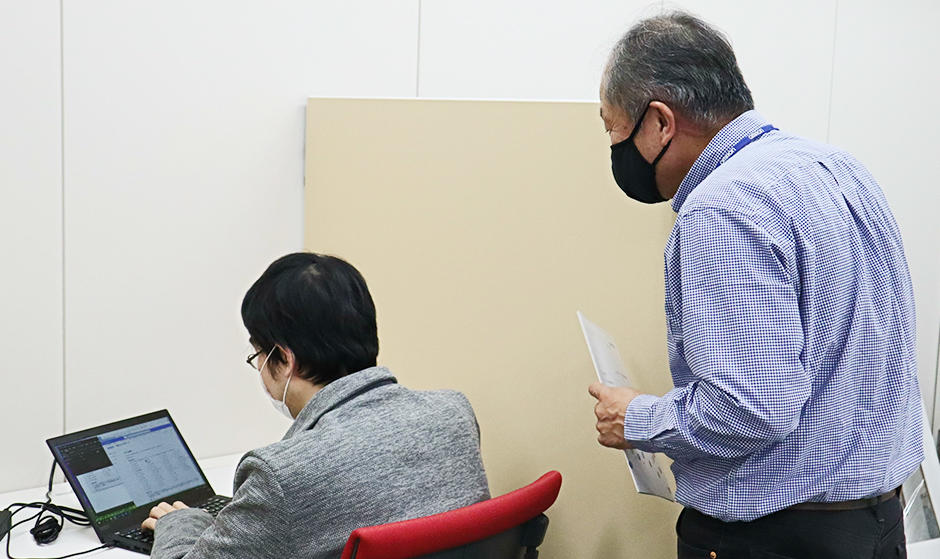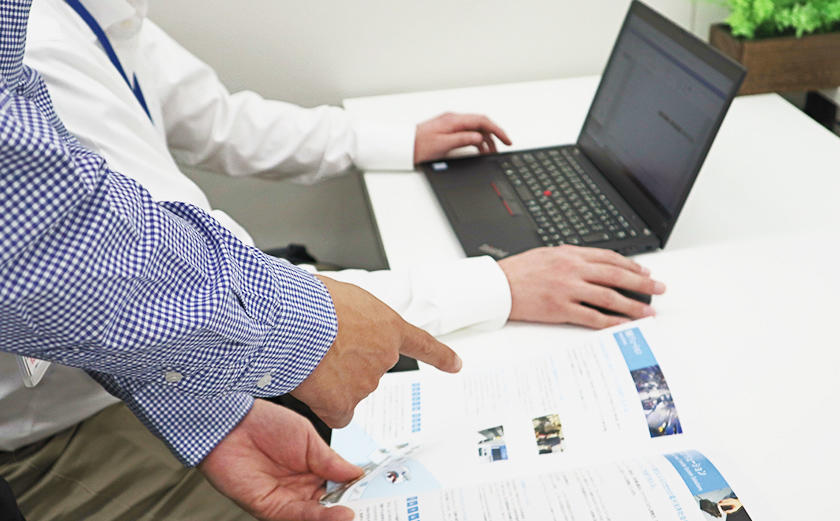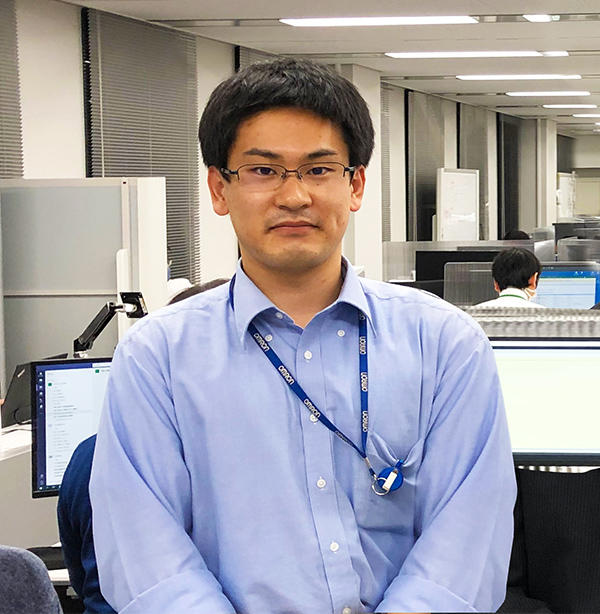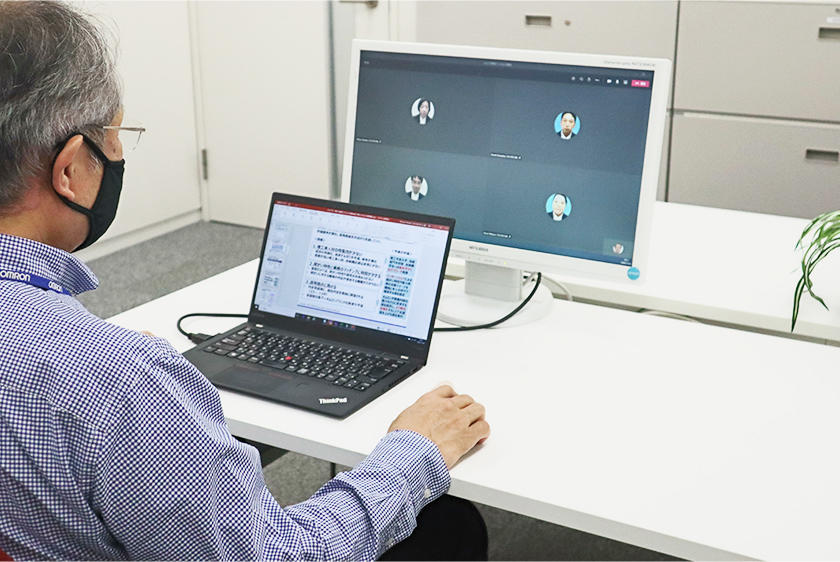
In Japan, the number of persons with disabilities on the payroll of private enterprises has been growing year by year, hitting a record-high 530,000 persons in 2019*1. Yet, out of an estimated 2.06 million persons with mental disabilities (including persons with developmental disabilities [PDD])*2 in the country, only 3.3%*3 are employed, indicating there are not enough positions for persons with mental disabilities. Here's a story of how OMRON Software Co., Ltd. (OSK) is working on to solve this important social issue.
Ever since its foundation, OMRON has provided persons with disabilities with employment opportunities to bring out their unique potential. Since 2018, the Diversity Promotion Department of OMRON EXPERT LINK (OLI), which is responsible for personnel affairs, general affairs, and finance and accounting of the OMRON Group, has taken the lead in creating an environment and making the arrangements needed to include persons with disabilities. Their goal is to ensure that employees with disabilities can give full play to their unique i abilities and potential at every workplace within the OMRON Group, in addition to our special subsidiary companies of OMRON Taiyo Co., Ltd. and OMRON Kyoto Taiyo Co., Ltd., and contribute to the business performance of the Group. Working together with OLI to implement this new initiative is OSK, which offers inspired solutions to social issues through software development and service provision.
At the Corporate Solution Division (CS Division) of OSK, they hire five OLI employees with mental disabilities*4 for positions designed for such persons. Each of these five employees has one or more characteristics such as autism, ADHD, and Asperger syndrome. OLI and OSK are working on a joint project to allow them to deliver their full potential with a full understanding of their characteristics.

Assembled for a four-month-long in-house project to transfer the database of an old intranet to a new system were members with mental disabilities, overseen by Ohashi of OLI Diversity Promotion Department, who instructs and supervises them, and Project Leader Ishihara of OSK CS Division, who outsourced this development project.
Having never worked in a team with such diverse members, Ohashi and Ishihara began by reading materials on mental disabilities to deepen their understanding. Generally speaking, persons with mental disabilities are not very good at multi-tasking, are often moody, and easily feel uneasy. With these things in mind, they checked every single job needed for the project and carefully worked out who would have to do what and by when, so that every member could work on each tasks without stress. They also made it a rule not to give them the next job before each had finished their current job, and led the project steadily, taking every opportunity to speak to the members to see if each were doing fine or not feeling stressed. Thanks to their efforts, the team completed the transfer of the system within the given time frame.
"At first, I had uncertainties as everything was new. However, once we got started I was constantly surprised by the work of members," recalls Ishihara. What was profoundly astonishing was that the members completed the given tasks faster than expected.
"I had assumed it would take some time before the whole project would come to an end because the members could only complete the tasks one by one, rather than working on multiple tasks at the same time. Contrary to my expectations, they got each task done faster than we had imagined. They had never been exposed to such jobs, but they quickly comprehended their tasks and completed everything quite smoothly. One of the typical characteristics of persons with mental disabilities is a tendency to focus on one thing, and they marvelously displayed this strength of theirs. Because of their work, we were able to accelerate the schedule of the project." (Ishihara)

For members with mental disabilities to bring out their unique abilities and potential and contribute to business performance, it is important to create a workplace environment and make arrangements that allow all members of the team to understand each other and thus prevent them from feeling concerned. Every morning, their team spends thirty minutes together to share their progress, which is an opportunity for everyone to speak their mind, including their physical condition and what is puzzling/baffling them at work, as well as daily work progress reports.
To a member who speaks anxiously about their mistake, others try to soothe them by saying, "It's not a mistake at all. Perhaps you followed a slightly different procedure" or "Yeah, that's a tricky job." And to a member who has reported on the progress of their work, they praise each other, saying, "Did you say you've finished the job already? That's super quick. Awesome!" If someone says, "I don't get this programming language," others may suggest, "Why don't we gather together to study it next week?" Conversations like these occur spontaneously.
It's little communications like these that foster mutual trust among the members, which then allows everyone to bring out their very best and generate high output. The members are currently working from home due to COVID-19, however they can still communicate frequently by taking advantage of the company's tools for virtual meetings and chatting.

Having added more persons with diverse disabilities to their payroll, they have launched a second project.
"Our next step is to support employees with disabilities by encouraging all OMRON employees to deepen their understanding of the characteristics that their fellow workers have and bringing out their natural talent and competency, so that we can expand the scope and areas of work that they can handle comfortably. Working together with my colleagues with mental disabilities made me aware of the importance of understanding their characteristics, which is a prerequisite of tapping into the strengths of other team members. I believe this approach is viable when we work with members with a broad set of diverse skills and careers." (Ishihara)
This pioneering project has expanded avenues for the creation of working opportunities and expanding carreer opportunities for persons with disabilities at OMRON. OLI and OSK will remain committed to the creation of a society where everyone can fully demonstrate their diverse talents regardless of disabilities by providing a workplace that each individual can bring out their unique potential and strengths.